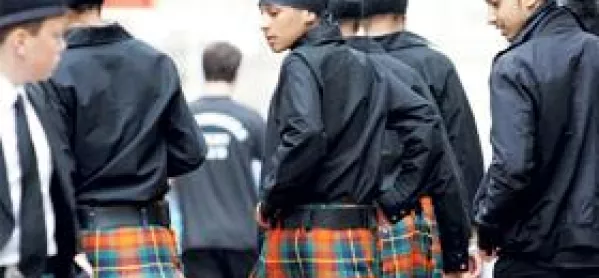Young minorities plan to `just say no’

An “overwhelming” majority of young people in Scotland from ethnic minorities plan to vote against independence, new research has found.
The as yet unpublished results, seen exclusively by TESS, reveal that more than 75 per cent of those asked who are eligible to participate in the referendum next month are set to say “no”.
Economic fears are the main driver of their opposition. Others are influenced by their families’ negative experiences of the division of nations, including the impact of Partition on India and Pakistan.
The survey also reveals a commonly held dislike and mistrust of the first minister Alex Salmond, who is widely seen as “quite egoistic”, although experts said it was hard to tell whether his personality and style drove young people to vote no or if their support for the union led them to view him negatively.
Respondents’ comments include “Alex Salmond just wants history”, “he doesn’t listen to anyone”, “he lies quite a bit, apparently” and “I think.he is a selfish git”.
The findings were welcomed by the Better Together campaign as evidence that the SNP’s decision to grant voting rights to 16- and 17-year-olds for the first time - which critics branded a cynical bid to secure more support - had backfired.
But Yes Scotland officials said the study, based on interviews with fewer than 300 young people, was a “small” sample that did not reflect the views of many in wider migrant communities from Eastern Europe, Asia and Africa.
Dr Rowena Arshad, co-director of the Centre for Education for Racial Equality in Scotland (CERES) and head of Moray House School of Education at the University of Edinburgh, said: “Our interviews so far find that over three-quarters of young people eligible to vote are likely to vote `no’.”
She added that the primary reason for their decision was a fear that an independent Scotland would not be economically viable or sustainable. “There is concern about whether a small country can afford the range of welfare provision that would be needed to meet people’s needs, such as having an effective NHS or to continue having free higher education,” she said.
“Others were sceptical that having access to North Sea oil would provide sufficient reserves to sustain the future.”
The four-year multidisciplinary research project was launched in 2013 by experts at the universities of Edinburgh, Newcastle and St Andrews to investigate “everyday” geopolitical issues for young people from ethnic minorities growing up in Scotland (see bit.lyGeopoliticsScot).
Findings to date are based on the views of 259 young people, mostly aged 16 to 20, who were asked which topics they most wanted to discuss. The referendum was raised almost universally by participants in the study, which is being funded by the Arts and Humanities Research Council.
Better Together said the findings, which follow earlier studies showing most teenagers in favour of the union, demonstrated that growing numbers of young people realised that staying in the UK brought “more opportunities” than breaking away.
However, Yes Scotland said it was working “very closely” with minority groups including Africans for Independence and Scots Asians for Yes, and argued that there was “strong evidence” of African, Asian and European migrants wanting to be represented by the Scottish government rather than Westminster.
A spokesman said this was because of “London’s anti-European agenda, the in-out referendum threat [on membership of the European Union] and the targeting of EU citizens on welfare entitlement.
“It’s also as a result of Westminster’s restrictive immigration and asylum policies and the methods they have deployed to target migrant communities, such as the `go home’ adverts.”
The Muslim Council of Scotland said that the community identified as “strongly Scottish” and included people who favoured independence. However, it said that some Muslims felt Scottish but nevertheless opposed breaking away, with personal experience of the impact of Partition giving the older generation a “negative vibe” about separation.
According to analysis of data from the 2011 census, published earlier this year, roughly 16 per cent of the population - some 850,000 people - do not class themselves as “white Scottish”.
Keep reading for just £1 per month
You've reached your limit of free articles this month. Subscribe for £1 per month for three months and get:
- Unlimited access to all Tes magazine content
- Exclusive subscriber-only stories
- Award-winning email newsletters


